'All the big things happening today in economic development have their beginning in Dr Manmohan Singh's ideas.'

It is very rare for an IAS officer to work with three prime ministers in his career. T K A Nair had the unique opportunity to work with I K Gujral, Atal Bihari Vajpayee and Dr Manmohan Singh.
Mr Nair had earlier told Rediff.com's Shobha Warrier that one couldn't compare Dr Singh with Prime Minister Narendra D Modi.
"He didn't want to take credit. He wanted everyone to see them, whether it was MNREGA or the nuclear deal, as the achievements of the country, achievements of a democratic government and not the achievement of one person," recalls Mr Nair who served as principal secretary to Prime Minister Manmohan Singh.
When he was criticised harshly by the Opposition, Dr Singh said 'History will be kinder to me than contemporary India'. As someone who worked with him closely, do you feel that way?
He said it when he was criticised for so many things, but he never showed any ill will or animosity towards those critics of his. They had their own axe to grind.
He accepted the criticism as he had the courage and conviction about the actions that he took.
Those who have known him not only as the PM but as the finance minister earlier knew that his was a life that was devoted to the service of this country.
In recent times, he contributed to the development of the country more than anybody else.
In a manner of speaking, he was the father of an economically resurgent India.
If Pandit Nehru laid the foundations of modern India, Dr Manmohan Singh laid the foundation of an economically strong, progressive, developing India.
The policies and programmes started by him aimed at the common man have been continued under one name or the other today. That in itself is a tribute to the lasting contribution of Manmohan Singh.

Do you feel India can ever forget programmes started by him like MNREGA, RTI, RTE...?
Yes.. yes.. so many such programmes! They are only a few as far as schemes are concerned.
If you remember one of his first successes was to appoint the Sachar Committee to look into the sad state of affairs of the minority communities.
The PMO actually had a special cell to process the recommendations of the Sachar Committee report.
He was particularly keen on giving good education to everyone more than occasional relief.
He believed in helping youngsters build good careers by providing them good education. He laid great emphasis on that. I remember we had several schemes like giving scholarships to the needy.
MNREGA reflects his concern for the rural unemployed.
His programmes for the removal of hunger are a major step forward in social welfare schemes.
He was a man who knew that the development process has to be integrated with social welfare schemes. You cannot do one at the expense of the other.
He was of the view that building the economy is not just building large industries. It has many facets.
He had a special concern for small and medium industries. As a matter of fact, we had drawn up a report on the steps to be taken to help them.
At the same time, he liberalised the economic regime which facilitated the emergence of Indian multinationals.
All the big things that are happening today in the field of economic development have their beginning in Dr Manmohan Singh's schemes and ideas.
Take, for instance, the educational institutions, health institutions. They got such a great fillip during his days. It's a good reason they are being carried on even today.
All prime ministers are committed to the development of the country. So, they will all carry forward the schemes which are good for the integrated development of India.
Was it not unfair to call him a 'weak' prime minister when he was initiating so many things for the development of the country? Is it not unfair to appreciate a person only after his death?
Well, it is unfair. But he never complained about criticism because he knew what he was doing, and he knew it was for the good of the country. So, he persisted doing them whether he was criticised or praised.
I have heard him saying the same thing -- that history will be a better judge.
He never took criticism to the level of animosity towards any section of society including his critics.
He was a thorough democrat and was not afraid of criticism as he believed in parliamentary democracy.
Above all, he was the most secular minded person in the country.
Also, he had special concern for the states which are underdeveloped. He used to tell me that states which are Opposition ruled and states which are in far-flung areas of the country should get special attention.
He was very particular that states which are not ruled by the Congress government are given their due share, that they should feel that they are taken care of.

You said he was not bothered by criticism. How did he take applause?
Neither was he bothered about criticism nor did he bother about applause.
He took both in his stride and stood for what he believed in, which was for the development of the country.
That is the greatness of the man.
You worked very closely with him. How do you describe him as a person, and also as the prime minister?
He is, undoubtedly, one of the best prime ministers India ever had.
The economic development of this country, and the way in which the country is progressing in modern times, is only due to him.
He did not lay the foundations of modern India because that was done long ago when India became independent.
But in the subsequent years, to my mind, he contributed the most as the prime minister of India in response to emerging global trends.
India is not an isolated country, it is part of the globe. So, it has to progress as part of the globe in moving forward.
As a person, he was above all petty considerations. He never bothered about praise.
He made it a point to tell us all the time, please, in your conversation with anybody, don't say this was done by so and so prime minister.
He didn't want to take credit for any good thing. He wanted everyone to see them, whether it was MNREGA or the nuclear deal, as the achievements of the country, the achievements of a democratic government and not the achievement of one person.
He never believed in a one-man show, he believed in the collective leadership of the country.

He had a humble and saintly disposition all the time. Was he like that?
Yes, he was. He was humility personified.
Any person, high or low, will never forget his humility; the way he received his visitors, and the way he saw them off at the door.
I had been a witness to that many, many, times. He always made it a point to see the visitor off at the door.
No one was as humble as he was.
We have not heard him use any harsh words against anyone, including his critics. A rare statesman-like quality which we don't see in today's times...
Hundred percent. He was above petty politics. He was not influenced by praise. He was also not upset by criticism; he tolerated criticism.
He respected Parliament and was present in Parliament during debates.
There was no question about his steadfast adherence to a democratic Constitution and democratic principles.
Today, everybody talks about his press conferences where he did not evade any question from the media...
Every year, he used to have a press conference and the entire media was present.
It was live, and he took questions from everybody. It was not in any way doctored.
He was not afraid of meeting the press and listening to criticism from them.

What were your personal interactions with him like?
I do not know how to describe them.
In a matter of speaking, I was a shadow of him. Nothing more than that.
He was not a person who liked to talk about himself. I am also not given to that. So, there was no personal matters coming into our conversations.
He used to talk to me about what bothered him as far as the country and his programmes were concerned.
My main responsibility was to help him in every possible way to make them a success.
It was never a show of the prime minister, it was the show of the Cabinet.
And he had tremendous respect for his Cabinet colleagues. I still remember he had senior colleagues like Pranab Mukherjee in the Cabinet, and he had great respect for him.
Never did he try to overrule them to show that he was the PM.
Though UPA1 was a success, UPA2 was marred by several scams and scandals, and it was perceived that he could not control the ministers indulging in corruption. Was he upset in those days?
Some of these reports did concern him. I am not very sure whether those concerns were personally conveyed to the ministers or not. But he was not very happy with some of the things that took place.
I have a lingering feeling -- I may be right... I may be wrong -- perhaps there were times he was mentally upset and under mental strain. At times, some of the happenings might have caused him concern.
Would you say with his death, it is the end of an era?
Absolutely. It is the end of an era.
It is the end of an era of gentlemanliness, it is the end of an era of real democratic values of give and take, and discussions and conversations being the basis for decision-making.
My own personal observation is that UPA1 was the crowning success of Indian democracy at its best.
After Pandit Nehru's times, it was the golden period for development, and for the successful functioning of parliamentary democracy in a federal set up.
Feature Presentation: Rajesh Alva/Rediff.com

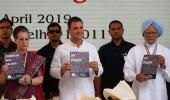

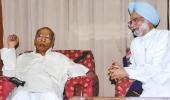




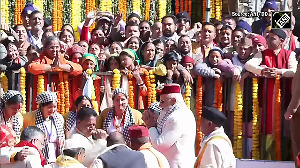
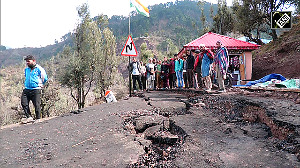
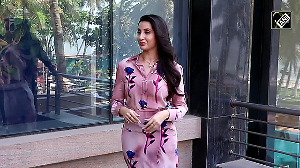
 © 2025
© 2025